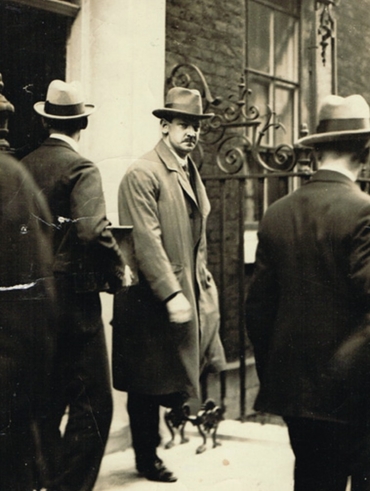Here's Part Five of my serialization of The Man Who Was Thursday, G K Chesterton's metaphysical thriller of anarchists threatening law and order in the years before the First World War. In my introduction, I mentioned that the Irish revolutionary Michael Collins was given a copy of Chesterton's novel, and gleaned a great insight from it. In tonight's episode, we hear the passage that had such an influence:
"Originally, of course, we met in a cell underground, just as your branch does. Then Sunday made us take a private room at an ordinary restaurant. He said that if you didn't seem to be hiding nobody hunted you out. Well, he is the only man on earth, I know; but sometimes I really think that his huge brain is going a little mad in its old age. For now we flaunt ourselves before the public. We have our breakfast on a balcony—on a balcony, if you please—overlooking Leicester Square."
"And what do the people say?" asked Syme.
"It's quite simple what they say," answered his guide. "They say we are a lot of jolly gentlemen who pretend they are anarchists."
"It seems to me a very clever idea," said Syme.
It is - and Michael Collins immediately put it into practice. There is a certain amount of that going on today, too: Antifa likewise hides in plain sight and its supporters are assumed by many of those who indulge them in the media and universities to be likewise "jolly gentlemen who pretend they are anarchists".
That is rarely the way to bet.
Members of The Mark Steyn Club can hear Part Five of our adventure simply by clicking here and logging-in. Earlier episodes of The Man Who Was Thursday can be found here, and previous Tales for Our Time here.
We always get a lot of queries about our tales' theme music. John Wilson, a First Week Founding Member from Colorado, writes:
Mark, thank you for not only bringing me great literature, but also for introducing me to great new (to me) music. Your theme this time introduced me to a composer I don't remember hearing before. After tracking it down, I was amused at the object of this particular 'chase' music. I won't steal your thunder, but let you roll out his identity in your own good time. But, I am going to enjoy more of his music.
There's a lot to enjoy, John. Havergal Brian was very prolific (32 symphonies) and remained so well into his nineties, even though by that point he had fallen entirely out of favor and he surely knew that nothing he composed was going to be performed. Despite the fancy Christian name he gave himself, he was a rare composer from the English working class, with only a primary-school education. He was self-taught in music, and dependent on an allowance from a benefactor (most of which went to his ex-wife) and, for a while, a day job in the Audit Office of the Canadian Expeditionary Force.
Our "chase" theme comes from his Fantastic Variations on an Old Rhyme, composed in 1907, the year before The Man Who Was Thursday was published. The "old rhyme" in question is "Three Blind Mice", but, unlike most of the works inspired thereby, this is a subtler affair, so in our theme music all you hear is the line about running after the farmer's wife. Given the various political analyses applied to "Three Blind Mice" over the years (the Oxford Martyrs, etc), I figured we could extend it to Chesterton's chases without much difficulty.
If you'd like to join John in The Mark Steyn Club, we'd love to have you: please see here. And, if you've a chum who enjoys classic fiction, we've introduced a special Steyn Gift Membership: you'll find more details here. Oh, and we also do video poetry.
Please join me back here tomorrow evening for Part Six of The Man Who Was Thursday.

